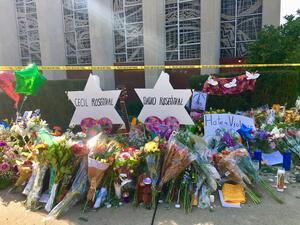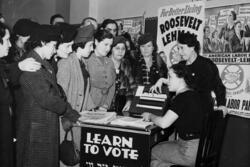A Rabbi Revisits Terror: Reflections on Pittsburgh
As both the rabbi of a congregation and the daughter of a victim of antisemitic violence, the recent shooting at Tree of Life synagogue in Pittsburgh hits very close to home.
My mother was killed in the terrorist attack on the Jewish Community Center in Buenos Aires, Argentina (AMIA) in 1994. I was 20 years old.
As the daughter of a victim of terrorism, my first thought each time I hear about a terrorist attack is about the families. Their lives will never be the same. Never. For years after my mother’s death, all I wanted was to go back to the moment before—before the bombing, before I learned that it was at my mother’s place of work, before her body was found a week later. But there was no going back, and it took a long while before I could move past the paralysis of wishing with all my heart to undo time.
Last Shabbat, at the time of the tragic shooting in Pittsburgh, I was leading services at Temple Beth Zion in Brookline, MA, where I am a rabbi. We were celebrating a bar mitzvah and the sanctuary was filled with a festive crowd. The news filtered in through the back of the crowd, but we made the decision to preserve the feeling of joyous celebration, knowing that all too soon, our mood would shift to one of mourning and reckoning. After kiddush, as the crowd thinned and the room quieted, I sat with a teary congregant who wondered aloud how—if—we could hold onto the innocent joy of the morning, which now seemed forever tarnished by the blood that had been shed in Pittsburgh.
I certainly understood her question, and the yearning to return to the moment before. But I feel that the moment before this attack, we were no less in danger of violence fueled by bigotry than we are now. As Jews, the risk to our actual safety is unchanged.
Though Saturday’s attack was the most deadly antisemitic incident in the US, it is hardly the first time this kind of violence has happened. In fact, just last Wednesday, two African Americans were gunned down at a grocery store in Kentucky, in what appears to have been a hate crime. And this was just the most recent in a spate of violent hate crimes over recent years, including the murder of nine African Americans by a white supremacist at a Charleston church in 2015 and the mass shooting at the Pulse gay nightclub in 2016, which killed 49 people. That this kind of targeted attack has now directly impacted a Jewish sacred space doesn’t mean the violence is worsening, it just means it’s harder for us to ignore.
Now that we are more sensitized to the hate and terror that continue to fester in our country, the real question—the test for the Jewish community—is how we will respond.
One of my strongest, most sustaining memories from the difficult period after my mother’s death is the way that the community came together to support one another. The Jewish community, in Argentina and globally, stood as one to mourn and to rebuild. We were also supported by the larger community. Some of the first people to reach out with messages of love and concern were our friends and colleagues from other faith backgrounds. We are seeing this same outpouring of solidarity and communal strength today, from both within and beyond the Jewish community. Christian and Muslim leaders are calling, showing up, and raising money for the Pittsburgh Jewish community. This demonstration of unity, care, and trust is a powerful repudiation of the hatred and fear that is at the root of all violence and terror. And we must learn from this and be sure, when the next horrible attack takes place, that we bring the same care and attention to the community that is targeted.
I also learned from the painful experience of the Argentina bombing the power that comes from refusing to give in to fear. Fear is, of course, a rational response to terrorism. It is terrifying and destabilizing to feel targeted and vulnerable. But if we allow fear to guide our actions, we have handed over power to the terrorists, who want to shut down our communities, take away our freedom, and taint our joy. Instead, we must continue to live fully and freely, even when it feels scary to do so. This does not mean we should be heedless, but we must continue to place our values at the center. In my congregation, for example, we are taking precautions based on the recommendations of our community leaders and security advisors, but the synagogue will remain open—wide open—for prayer and community.
Finally, we must hold onto hope. In Argentina, where we lived under a dictatorship for so long, we were sadly accustomed to injustice. As a new American citizen, I refuse to sit back and allow this kind of violence, racism, and white supremacy to grow unchallenged. When we become jaded and cynical and believe that violence, hatred, and terror are ordinary, expected parts of daily life, we make space for such things to take deeper root.
Despite the despair that comes easily these days, we must continue to believe that change is possible and that we have the responsibility to bring it about. Thankfully, we find ourselves at a moment when there is one obvious way to exercise this responsibility—in these final days of the election season, we must dedicate ourselves to getting out the vote, and using our vote to send a clear message of love and compassion, not fear and hate, for the “other” among us. Doing so is a life-affirming act. Doing so creates a better world for our community today and for future generations.








Todah Rabbah Rav Claudia! May we be inspired by the memories of those whose lives were taken to make our own lives meaningful in the continued struggle to create a better world,
My Rabbi is a heroine and a profoundly wise, generous and vibrnt young mother. I am so proud to be part of her congregation.
Your words have deeply moved me. I lost my father when I was very young (10)due to natural causes. But a loss is still a loss. The untimely loss of the 11 victims was frightening. My heart goes out to all of the victims families. I have found out that time is a great healer. I am now 72 and though I think about my father every so often it is no longer heart wrenching.
Thank you, Rabbi, for sharing this personal, painful story, and your hope, Hatikvah, for our community.
Kol haKavod Rav Claudia for this compelling and inspiring piece. I am moved beyond tears to more action.
I am so sorry for the horrible way terrorism has touched you personally and I thank you for your positive words.
Thanks for your wisdom . I am always happy to listen to you.